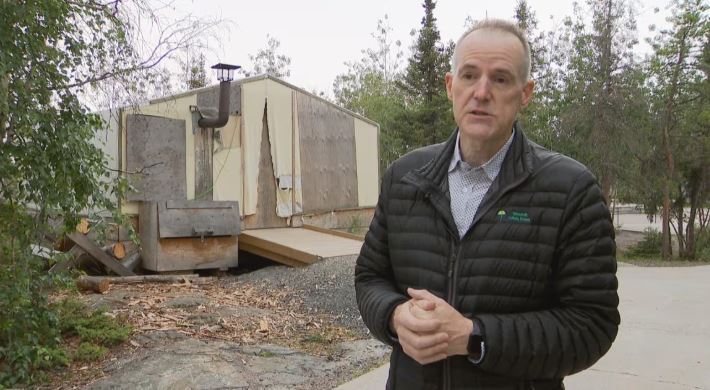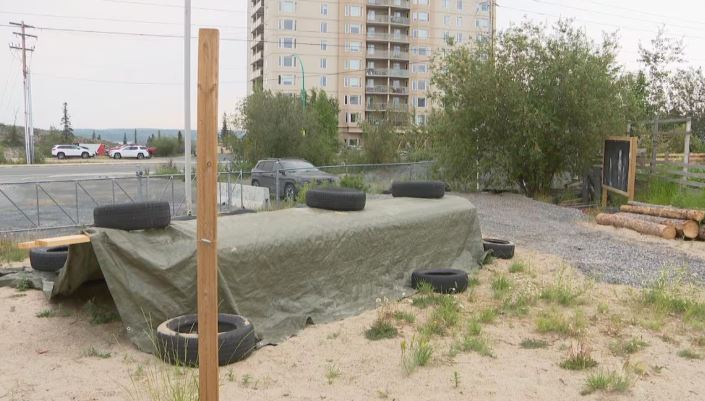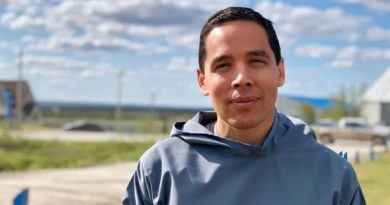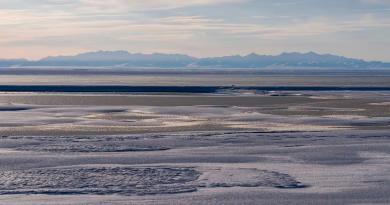Yellowknife school launches land-based junior kindergarten

By Sarah St-Pierre
Gloria Gaudet has been teaching junior kindergarten for two years, and come the fall, she will be doing it a whole new way. She will lead Weledeh Catholic School in Yellowknife’s first land-based junior kindergarten class.
“I am excited and a little nervous. I think it’s such a great opportunity to connect to the children, to the land and our traditional ways at an early age,” she said. “And it’s also a big responsibility.”
The new program, open to up to 20 kids, will split the school day between an indoor and outdoor classroom, merging the existing junior kindergarten curriculum with outdoor play and traditional knowledge. So far, three quarters of the spots have already filled up.
The program has been in the works since last fall and was designed with help from Weledeh staff, the school district’s Indigenous language education team and their connections with the community, from whom they sought feedback.

“One of the biggest things we heard is that we want these kids to understand the importance of the land and how valuable it is,” said Paul Kelly, the school’s new principal.
He also sees the return to play as a potential way to fend off the rise in mental health concerns observed in schools “not just here, but all over the world.”
Kelly says the aim is to bring back opportunities for adventure, exploration, and safely taking healthy risks while playing outside that have been missing from the existing model.
Weledeh is in the early stages of building a fenced outdoor classroom area, and will have a fire and cabin for the winter. Part of the outdoor learning will also happen through field trips where possible. Kelly says some existing facilities on the school grounds will also be used for the class, like tents that provide warmth in the winter.

Mandee McDonald, a faculty member at the land-based Dechinta Centre for Research and Learning in Yellowknife, says she has not seen many models combining land-based and Western education in the public education system.
“The value that I see in land-based programming is specifically from Indigenous knowledge holders being able to teach land-based knowledge, connection to the land, Indigenous worldviews to Indigenous students,” she said.
“Though I also strongly think that all those lessons around Indigenous worldviews and ways of doing and ways of being are extremely beneficial for all young people to learn.”
Kelly said that while the school is only starting with junior kindergarten, there are hopes to scale up the program all the way up to high school in due time.
“I think in the back of our minds, everyone who’s invested in this is thinking next year it’s going to be kindergarten, maybe down the road it’s going to be Grade 1 and 2,” he said.

McDonald says she sees promise in exposing the students to ways of knowing the Western curriculum doesn’t include.
“In my experience, with the public education system, and this is kind of documented in the literature as well, there’s a lot of underlying racist assumptions built into Western models of education and the things that we’re taught in the school system,” she said.
She says offering a land-based program can be a way to undermine that.
At Weledeh, the plan is for elders to visit the outdoor classroom to share their language and culture with the children. Gaudet expects the kids in her class will learn about Dene law, fire-feeding, drumming and more.
“I am very excited to have the community involved at the school, tell their story and share their stories,” she said.
Related stories from around the North:
Canada: Honorary degree caps a career spent preserving, promoting, Dene culture, language, CBC News
Finland: Sami Parliament in Finland agrees more time needed for Truth and Reconciliation Commission preparation, Eye on the Arctic
Greenland: Danish PM apologizes to Greenlanders taken to Denmark as children in 1950s, Eye on the Arctic
Norway: Sami-led project seeks to revitalize Indigenous education across Arctic Europe, Eye on the Arctic
Russia: Schools in Murmansk, in Arctic Russia, told to teach anti-Ukraine propaganda, The Independent Barents Observer



